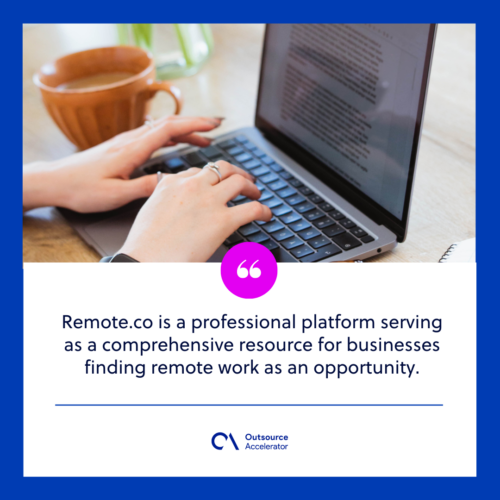How to Develop a Successful Team of Remote Professionals
In today's increasingly electronic landscape, the capability to develop a successful team of remote specialists is necessary for organizations intending to grow. It is the subtler elements-- like supporting a cohesive company culture and promoting continuous learning-- that can genuinely set a remote group apart.
Define Clear Objectives and Expectations
Regularly establishing clear objectives and assumptions is essential for the success of a remote group (Remote Professionals). Without these components, group participants might experience complication regarding their functions, obligations, and the overall objectives of the project. This uncertainty can cause lowered productivity, misaligned efforts, and ultimately, project failure
To define clear objectives, it is essential to use the wise requirements-- Specific, Quantifiable, Attainable, Relevant, and Time-bound. This method makes sure that each goal is well-defined and can be properly connected to all team participants. It is crucial to straighten private purposes with the overarching vision of the organization, cultivating a feeling of purpose and dedication among group participants.

Foster Effective Communication

Routine check-ins and team conferences can assist keep a strong communication circulation, allowing participants to share progression updates and go over any kind of obstacles they might encounter. It is additionally vital to recognize that different people might have differing interaction styles. Understanding and fitting these differences can bring about even more meaningful interactions and a much more cohesive group dynamic.
Furthermore, clarity is essential in all forms of interaction, whether created or verbal. When needed, encourage group participants to articulate their ideas succinctly and to seek clarification. This strategy lessens misunderstandings and ensures that everyone gets on the very same web page. By focusing on efficient communication, remote teams can enhance performance, reinforce partnerships, and develop a more comprehensive job setting, eventually causing higher success in accomplishing usual goals.

Make Use Of the Right Devices
To support efficient interaction within a remote group, it is very important to utilize the right devices that promote partnership and streamline workflows. The choice of tools can substantially impact efficiency, ensuring that staff member continue to be connected and involved despite geographical distances.
Begin by applying project administration software application, such as Trello or Asana, to arrange tasks, set deadlines, and track progress. This fosters accountability and supplies presence right into each participant's payments. Additionally, communication platforms like Slack or Microsoft Teams offer instantaneous messaging capacities, making it possible for real-time conversations and quick decision-making.
Video clip conferencing tools, such as Zoom or Google Meet, are important for face-to-face interactions, which aid construct connection and reinforce relationships among employee. Paper sharing and storage services like Google Drive or Dropbox guarantee that essential files are editable and accessible by all team members, promoting partnership on tasks.
Incorporating these devices properly produces an atmosphere where remote professionals can grow. By picking the ideal technology, organizations can boost communication, enhance project monitoring, and eventually achieve their objectives a lot more effectively.
Build a Solid Business Culture
Creating a solid company culture within a remote team is important for promoting involvement and commitment amongst staff members. A distinct culture provides a sense of belonging and shared function, which is essential when staff member are spread across different locations. To grow this society, leaders should establish clear worths and expectations that reverberate with staff members, ensuring that everybody understands the goal and vision of the company.
Regular interaction is important in strengthening this culture. Utilizing video calls, group meetings, and casual check-ins can aid advertise and keep connections transparency. Furthermore, commemorating success, both big and little, reinforces a culture of recognition and recognition.
Urging group collaboration through virtual platforms not only improves productivity yet also fosters interpersonal connections - Remote Professionals. Organizing online team-building activities can additionally enhance bonds amongst staff member, making them really feel more integrated into the company
Lastly, it is essential to listen to employee feedback and adapt as needed. By revealing that their voices issue, leaders can construct trust fund and commitment, eventually producing a growing remote job setting where workers feel valued and engaged.
Encourage Continual Understanding and Growth
A these details solid company society prepares for encouraging continual learning and growth within a remote team. By promoting an atmosphere that values development, organizations can Home Page encourage staff members to boost their skills, adapt to brand-new obstacles, and eventually contribute better to team objectives.
To advertise constant knowing, consider applying routine training sessions, workshops, and webinars that align with both specific occupation goals and business requirements. Leverage technology to facilitate accessibility to e-learning platforms, making certain that resources are readily offered for remote employee.
Encourage expertise sharing by establishing mentorship programs and developing online forums for employees to trade insights and ideal methods. Identifying and awarding employee that proactively participate in finding out campaigns reinforces the relevance of development and inspires others to follow fit.
Moreover, carrying out normal feedback sessions can assist recognize skill gaps and areas for renovation, permitting tailored development strategies. By prioritizing constant understanding and development, remote teams can grow a society of development, versatility, and strength, which are crucial for navigating the complexities of today's company landscape.
Final Thought
Finally, the facility of an effective remote group pivots on the assimilation of clear objectives, reliable interaction, appropriate tools, a robust business culture, and you could try this out continuous knowing chances. By lining up private contributions with organizational objectives and fostering an environment of openness and partnership, remote experts can flourish. Remote Professionals. The implementation of these techniques not only boosts group communication however likewise drives motivation, ultimately bring about boosted efficiency and success in a remote functioning landscape
It is the subtler elements-- like nurturing a cohesive firm society and advertising continuous learning-- that can truly establish a remote team apart.Effective communication is the foundation of a thriving remote group. By focusing on effective interaction, remote groups can improve productivity, reinforce connections, and create an extra comprehensive work setting, eventually leading to better success in attaining typical objectives.
Producing a strong firm culture within a remote group is necessary for promoting engagement and commitment among staff members.In final thought, the establishment of an effective remote team pivots on the combination of clear objectives, efficient communication, proper tools, a durable company society, and continuous learning possibilities.